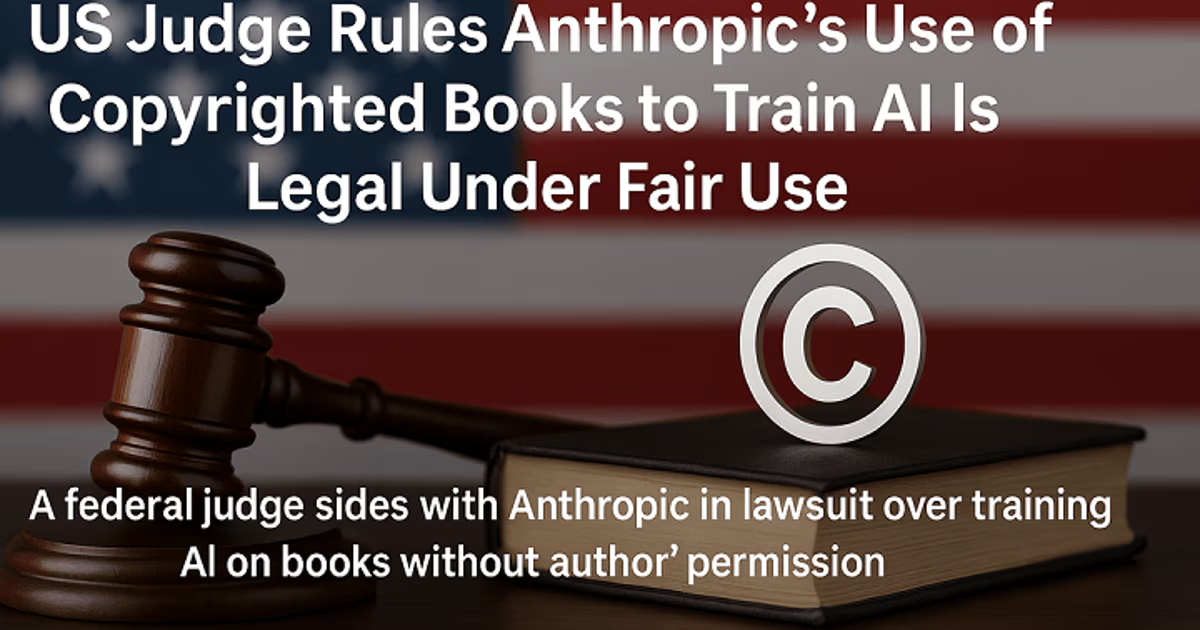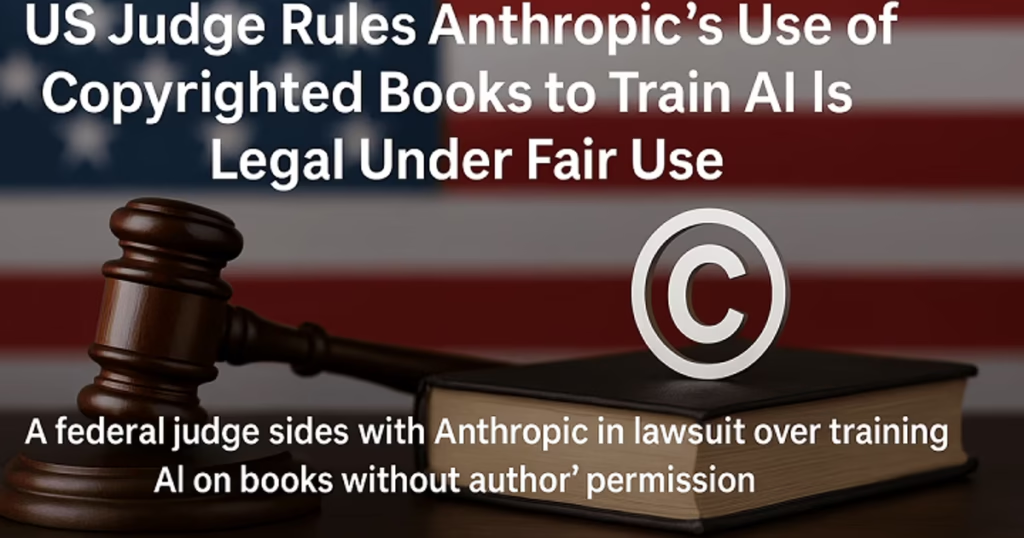Physical Address
304 North Cardinal St.
Dorchester Center, MA 02124
Physical Address
304 North Cardinal St.
Dorchester Center, MA 02124

Upgrading to Future

Upgrading to Future

US Judge Rules Anthropic’s Use of Copyrighted Books to Train Generative AI is Legal Under Fair Use.
In a landmark decision that’s being closely watched by tech leaders, publishers, and legal experts, a U.S. federal judge has ruled in favor of Anthropic in a closely followed AI copyright infringement lawsuit. The court concluded that the company’s use of copyrighted books to train its AI model Claude was lawful under the fair use doctrine—a key component of copyright law and AI ethics discussions.
This ruling could serve as a legal foundation for the future of AI model training data and has far-reaching implications for the generative AI industry, especially concerning AI and intellectual property rights.
The Anthropic AI lawsuit originated from claims brought by a group of authors and publishers who alleged that the company had used copyrighted books without permission to train its large language model. They accused Anthropic of violating intellectual property laws by copying and processing entire works of fiction and non-fiction to teach its AI how to interpret and generate human-like responses.
Anthropic, however, defended its practices by arguing that its methods were transformative and fell under fair use AI training standards. The company said that it did not store or redistribute the books, but used them to enhance the AI’s ability to understand language patterns and generate content.

The federal judge overseeing the case sided with Anthropic, noting that the company’s practices aligned with existing interpretations of fair use doctrine. According to the court, Anthropic’s model did not reproduce the books’ content for commercial sale or direct consumption, but rather used them in a transformative way to teach its AI language skills.
“Using literary works to develop generative AI capabilities is a form of transformation—not replication,” the ruling stated.
This judgment follows the legal precedent set by cases involving Google Books and search engine indexing, which were also deemed fair use because they did not threaten the original market value of the content.
In the United States, fair use permits limited usage of copyrighted material without explicit permission, based on:
In Anthropic’s case, the use of books to train Claude was considered transformative and not a direct substitute for the originals. Therefore, it qualifies as fair use AI training.
For companies like Anthropic, OpenAI, and Meta, this ruling strengthens the argument that AI model training data can include a wide range of copyrighted materials—if used in a way that adds new purpose and doesn’t compete with original works.
Many in the AI in publishing industry are not celebrating the ruling. Authors and publishing houses fear that this sets a precedent that enables generative AI developers to use creative work without compensation or acknowledgment.
The Authors Guild, one of the plaintiffs, expressed concern that the decision erodes creator rights.
“AI copyright infringement is real, and unchecked use of our books risks devaluing our entire profession,” said a spokesperson from the Guild.
This sentiment highlights the growing rift between traditional content creators and modern AI firms. The former seeks protections for their intellectual labor, while the latter prioritize access to diverse datasets to build smarter machines.
From a business and innovation standpoint, this decision is a massive win for generative AI developers. With the court recognizing AI training as transformative, companies like Anthropic now have stronger legal grounds to incorporate a wide range of texts—including copyrighted ones—into their training protocols.
This opens doors for more advanced AI language models, capable of better understanding nuance, structure, and style thanks to rich, well-rounded datasets. The development of smarter virtual assistants, chatbots, and AI writing tools may now accelerate, thanks to this legal clarification.
However, it also brings new urgency to conversations around ethics, licensing, and AI regulation.
Although this U.S.-based decision sets an influential precedent, it doesn’t resolve all the legal complexities. In fact, it may spark even more lawsuits in other jurisdictions. Countries with stricter copyright laws—such as those in the EU or Asia—may not accept the same interpretation of fair use or transformative use.
Multiple AI copyright infringement cases remain pending, including against major players like OpenAI and Microsoft. Each new decision will shape the evolving framework for how AI model training data can be legally sourced and used.
Even if legally sound, is it ethically acceptable for AI models to be trained on copyrighted material without the authors’ consent?
Some AI companies—like Adobe and Shutterstock—have chosen to build their models using fully licensed and royalty-free content. Others, like Anthropic, maintain that fair use gives them the legal right to utilize high-quality, real-world data—including books—for training purposes.
From a practical perspective, companies argue that excluding copyrighted works from training datasets would lead to biased, limited, and less accurate AI outputs.
Still, the AI and intellectual property debate is far from settled. Many creatives are pushing for stronger opt-out mechanisms, transparency in training sources, and new compensation models.
For creators, this ruling represents both a legal setback and a wake-up call. The need for updated copyright legislation that addresses generative AI legal issues is now clearer than ever.
Policy proposals like the “NO FAKES Act” and AI disclosure laws are being discussed in Washington and beyond. These may eventually introduce frameworks that balance innovation with author rights, perhaps even leading to licensing systems for AI training data.
Also Read Groundbreaking AI Policy Report
The court’s decision in the Anthropic AI lawsuit marks a defining moment for the future of copyright law and AI. While it offers relief and clarity for AI developers, it has intensified the battle for creative control and fair compensation.
Whether this leads to new norms in AI book training, innovative legal frameworks, or more polarized debates remains to be seen. But one thing is certain: the age of generative AI has officially collided with the traditional publishing world—and the story is far from over.